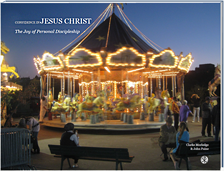While the Old Testament has numerous references to the promise of the Land, the New Testament, in comparison, is somewhat sparse. Nevertheless, we do find passages that touch on this, even if indirectly.
For example, after the resurrection and just prior to His ascension to heaven, the disciples asked a loaded question:
Lord, will you at this time restore the kingdom to Israel?” (Acts 1:6b)
If there was ever a golden time for Jesus to address the question of the land promise, now that the Messiah had come, it would have been then. Like most Jews of the day, these early Jewish followers of Jesus were probably expecting Jesus to establish His Kingship, boot the Romans and other pagans out of the Holy Land, and setup shop in Jerusalem at any moment. But Jesus appears to sidestep the question, before he disappears from the disciples’ presence.
He said to them, “It is not for you to know times or seasons that the Father has fixed by his own authority. But you will receive power when the Holy Spirit has come upon you, and you will be my witnesses in Jerusalem and in all Judea and Samaria, and to the end of the earth.” (Acts 1:7-8)
He tells his disciples not to worry about the “when” question. Nevertheless, we are left with some questions that concerns us: What is meant by this restoration of the kingdom to Israel? Is the land promise, going back to the Old Testament, included, and is it still in effect? Will Jesus, someday physically rule over a restored national Israel?1
Interestingly, Jesus redirects their focus. He tells them to be witnesses for Jesus in Israel, but not only in Israel. They are to be witnesses through the whole world. This is not about establishing a worldwide Jewish theocracy. It is about a spiritual kingdom. But does this rule out a physical, literal Jewish kingdom in the Holy Land? Not necessarily. But is Jesus confirming their expectations for a physical literal Jewish kingdom? Not necessarily either. Perhaps we need to look at another passage to find a clearer answer.
A Look At Romans 4:13
Another related passage is found in Romans 4:13. To set this up, we should be familiar with the context. The Apostle Paul in Romans 4 is in the middle of an argument, where he is using Abraham as his “Evidence A” for establishing why it is faith, and not adherence to the Law of Moses, that makes a person righteous.
First, he argues that Abraham’s faith was counted as righteousness before he became circumcised, not afterwards. In other words, he was still a Gentile when he entered into faith, in response to God’s initiative to establish a covenant, that would include Abraham and his descendants (Romans 4:10). This would have been scandalous for the traditional Jew to hear. Was not Abraham the great law-keeper, par excellence, before the arrival of Moses (Genesis 26:4-5)? It would seem that Paul just opened up the way for Gentiles to become children of Abraham, through faith, and not by the works of the Law.
So, what then would have Paul’s readers done when they get to Romans 4:13?
For the promise to Abraham and his offspring that he would be heir of the world did not come through the law but through the righteousness of faith.
What does it mean to say that Abraham, along with his offspring, would become heir of the world? Does not the Old Testament make it clear that the promised land would have prescribed borders in the Middle East? What does he mean by “world?”
First, Paul is expanding the sense of how one becomes part of the people of God. By emphasizing faith in Christ, Paul is expanding the sense of God’s covenant people to include Gentiles, as well as Jews. Now, it would appear that Paul, along with redefining how one is made righteous, is also here redefining the meaning of the land promise. By linking the promise with the world, it looks like Paul is expanding the sense of the land to include the whole world, and not just a piece of real estate in the Middle East. Is this pointing towards the idea of “land” as really being the coming “new heaven and a new earth,” as described in Revelation 21:1?3
Well, maybe…. then again, maybe not. What I have just described is one of the major proof texts used by those who seriously question the literal fulfillment of the Jewish land promise. We must consider another approach that seriously challenges this view. There is more to the story, which we will explore next time.
Notes:
1. Protestant Reformer John Calvin comments that the disciples’ question betrays a measure of ignorance and foolishness, as though they had never really learned anything during the three years that they were with Jesus: “There are as many errors in this question as words.” Calvin understood that the Gospels repeatedly demonstrated the ignorance of the disciples, and Acts is no exception. However, pro-Zionist critics of Calvin on this point say that the great Reformer was allowing his amillennial, Augustinian bias to blind him from seeing the continued validity of the physical, restoration hope for national Israel, as being taught in the New Testament (see Barry Horner, Future Israel, p.5-7 on Kindle).↩
2. Dispensationalist scholar Michael Vlach, from the Masters Seminary, makes the argument that Jesus’ decision not to explicitly correct his disciples expectation for a restoration of national Israel is actually an argument in favor of Zionism. See also Dallas Seminary’s Darrell Bock response, that affirms Vlach, noted in this book review. But this seems to me to be an argument from silence, which is not wholly persuasive, as this former dispensationalist blogger demonstrates effectively. The argument could go either way. Furthermore, Robert L. Thomas in Perspectives on Israel and The Church, p. 111, makes a similar argument as Vlach, even citing the angelic(?) encouragement to the disciples following Jesus’ ascension in Acts 1:10-11, as further evidence: Jesus would come back to earth in the same manner he went to heaven. To Thomas, this is “strongly implying” that the disciples expectation for an earthly, messianic kingdom was correct. Well, perhaps, those like Vlach, Bock, and Thomas are correct, but I still have a question: Were Jesus and His disciples really on the same exact page as to what this messianic rule would look like? We would have to reflect more on how the Gospels understand the nature of Israel’s restoration and the messianic rule (see Darrell Bock’s argument based on his impeccable analysis of Luke-Acts, in this video. Bock’s presentation might win a non-Zionist over!!).↩
3. Romans 4:13 plays a huge role in critiques of Zionism, ranging from the vocal Gary Burge, of Wheaton College (see future Veracity post), as well as venerable Old Testament scholar Bruce K. Waltke, in The Dance Between God and Humanity: Reading the Bible Today as the People of God, from this selection in Google Books.↩



August 24th, 2016 at 10:48 pm
Thanks so much Clarke! I just finished listening to Darrell Bock’s talk on Luke-Acts and was totally impressed with his entertaining and fast-paced presentation. But he really didn’t have too much convincing to do to win me to his side.
I grew up in a Reformed tradition in which there was little room for a an end times national Israel, but abandoned such teaching long ago as I read through all the Old Testament prophets. I realized that I had to “spiritualize” their promises in order to believe that God had no use for a future Israel. I became convinced that I should simply take the prophets at their word, and Bock’s treatment was like an Amen to my thinking.
LikeLike
August 25th, 2016 at 12:08 am
Ken: What stood out in Darrell Bock’s presentation is the point that a spiritual fulfillment of the promises towards Israel does not necessarily rule out a literal fulfillment of those promises. I had not heard it put that way before.
As I hope will become evident in these and other future blog postings in this series, there are good arguments for both sides in this discussion.
I am still learning about and wrestling with this, but Bock’s “progressive dispensationalism” seems like an attempt to hold onto some of the good points about a dispensationalist approach, while rejecting the more difficult aspects of “classic” dispensationalism that have made me cringe.
LikeLike